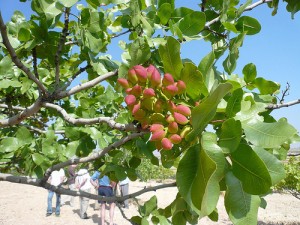 July 12, 2010 update: This Haaretz article, titled “On one thing they agree: ‘Allahu akhbar’,” was the beginning of a years-long email conversation with Janna. Sometimes heated but always interesting…
July 12, 2010 update: This Haaretz article, titled “On one thing they agree: ‘Allahu akhbar’,” was the beginning of a years-long email conversation with Janna. Sometimes heated but always interesting…
http://www.haaretz.com/print-edition/news/on-one-thing-they-agree-allahu-akhbar-1.219670 or http://bit.ly/9UfSj6 or http://tinyurl.com/3ayjus7
The article was about the interaction of Jewish and Muslim worshippers at an ancient shrine regarded as Joshua’s grave, located in the heart of the Palestinian village of Kifl Harith. Despite the fact that it is a structure from the Mameluke-Ottoman period in the 15th century, Haaretz reports that a “giant Israeli Pistacia tree has grown from inside Joshua’s grave, and some people climbed onto the roof to break off whole branches to serve as a talisman or amulet.”
That bizarre sentence prompted me to add this comment to the article:
A giant Israeli Pistacia tree? The revision continues, even in silly little stories like this. Whatever happened to Pistacia palaestina (http://www.ars-grin.gov/cgi-bin/npgs/html/taxon.pl?28650)? Or did this particular tree miraculously burst forth from Joshua’s rotten carcass after 1948, after Western empires anointed their artificial colony of unwanted Europeans with statehood?
To which Janna (who I did not then know) added three more of her own:
Israeli Pistacia tree – Part 1 of 3: [Monsieur d’Nalgar] from Hot Springs has preceded me in correcting the botanical error (Talkbalk: A giant Israeli Pistacia tree?). The unfortunate translation of the Hebrew “Elah eretz-yisraelit” is obviously the work of a translator ignorant of botany, which is common enough. However, there is a revisionist basis for the error that merits attention. The Israeli Zionists, in their passion to create a Jewish homeland, viewed the revival of the Hebrew language as an imperative of the new state for the formation of a Jewish national identity. Place names and the names of every intersection were changed, from their Arab names, possibly also to obliterate the memory of hundreds of destroyed, abandoned and evacuated villages. (Moshe Dayan once remarked on this renaming in an address to Haifa Technion students. Zochrot, a non-profit organization, is gradually rectifying the lack of acknowledgment.) (continued Part 2)
Israeli Pistacia tree – Part 2 of 3: A verb was created, ?to Hebrew-ify? (noun: Hebrew-ification), and people, especially those in the government service, were asked to ?Hebrew-ify? their last names. Scientists took on the daunting task of providing ?scientific? Hebrew binomial translations of Latin binomials; each organism was assigned a consistent generic and specific Hebrew epithet. (This scientific undertaking is quite distinct from the common names of plants that are found in every language, and, as far as I know, unique to Israel.) In line with the change of the new state?s name from Palestine to Israel, Pistacia palaestina, became ?Elah eretz-yisraelit,? indeed, ?Israeli Pistacia.? I have had occasion to hear one botanist express retrospective doubt, and perhaps tentative regret, about the enterprise—today Israeli students of botany have difficulty learning Latin binomials, so accustomed are they to using Hebrew binomials.
Israeli Pistacia tree – Part 3 of 3: My own regret is that the languages of the state are not Arabic and Yiddish. The European Jews lost not only a language but also a rich sense of humor, and Jews from Arab countries would have retained their native tongue, as well as their self-respect. We would be conversing freely with our Arab neighbors, much as my Yavneel pioneer relative did before the establishment of the state. The Arabs and Jews from Arab countries might have been our respected language teachers, rather than our denigrated and feared ?other.? Language is an important door to rapport and cross-cultural understanding; lack thereof a sad barrier. Since the last intifada I have been progressing in spoken Arabic, have gained many friendships and discovered humor and warmth among my Arab neighbors. (Needless to say, I do not speak my grandparents? Yiddish. http://groups.msn.com/WaldorfS/mazan.msnw) Today, ?The Abraham Fund? is introducing a new spoken Arabic program into Israeli schools. Better late than never
Intrigued at the discovery of an Israeli who actually agreed with me, I found her email and wrote:
Dr. Weiss,
Thank you for your most interesting response re. the pistachio tree mentioned in the Haaretz article. It is delightful to hear that some Israelis yearn for coexistence with their ancient Arab brethren. I am an American who was born and raised in Beirut (my parents were missionaries). Like too many self-absorbed Westerners, I failed to fathom, until the land of my youth was a distant memory, the injustice and suffering perpetrated on the Palestinians because they had what others wanted to take from them. I refuse to be silent now, especially after last summer’s rape of my beloved Lebanon.
Sincerely hoping that your sentiments are not rare among Israeli Jews.
